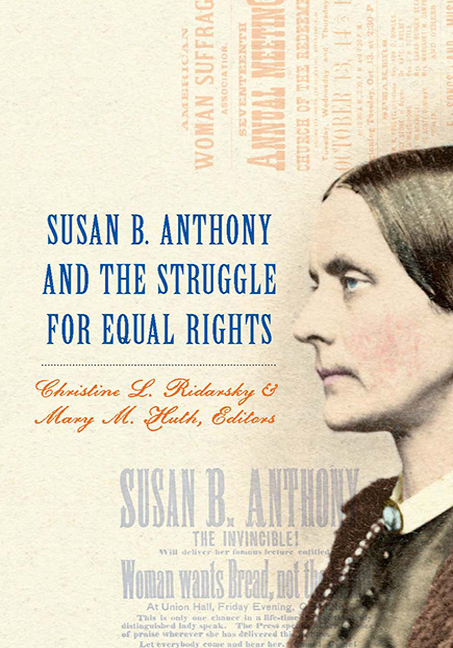Book contents
- Frontmatter
- Dedication
- Contents
- Preface
- Introduction
- Part 1 Constructing Memory
- Part 2 Anthony and Her Allies
- Part 3 Broadening the Boundaries of the Equal Rights Struggle
- Chapter 4 Others and Origins: Nineteenth-Century Suff ragists and the “Indian Problem”
- Chapter 5 Frances Watkins Harper and the Search for Women's Interracial Alliances
- Chapter 6 The Ladies’ Land League and the Labor Question: Irish-American Women and Social Reform in the Late Nineteenth Century
- Part 4 Reconstructing Memory
- List of Contributors
- Index
Chapter 4 - Others and Origins: Nineteenth-Century Suff ragists and the “Indian Problem”
from Part 3 - Broadening the Boundaries of the Equal Rights Struggle
Published online by Cambridge University Press: 09 May 2017
- Frontmatter
- Dedication
- Contents
- Preface
- Introduction
- Part 1 Constructing Memory
- Part 2 Anthony and Her Allies
- Part 3 Broadening the Boundaries of the Equal Rights Struggle
- Chapter 4 Others and Origins: Nineteenth-Century Suff ragists and the “Indian Problem”
- Chapter 5 Frances Watkins Harper and the Search for Women's Interracial Alliances
- Chapter 6 The Ladies’ Land League and the Labor Question: Irish-American Women and Social Reform in the Late Nineteenth Century
- Part 4 Reconstructing Memory
- List of Contributors
- Index
Summary
Throughout the nineteenth century, white women's rights activists discovered—and constructed—their political identities in relation to an “other.” As Blanche Glassman Hersh argues in her foundational The Slavery of Sex: Feminist-Abolitionists in America, antislavery work prompted white women to a keener awareness of their own status in antebellum political culture. Finding themselves relegated to an auxiliary role in antislavery work and encountering heated opposition to their assertion of a right to speak publicly, white women reformers in antebellum America found that the cause of freedom for others required that they first liberate themselves. At the same time, the idea of slavery in the abstract resonated for white women activists as a metaphor for their own existence, a trope that helped them articulate in the most pointed language available what they felt their own condition to be. In contemplating the national other of the slave, the women of the abolitionist movement both discovered the need for and developed the terms of a powerful new rights discourse for themselves.
But the nineteenth century offered another national other, another political peer in whom white women could find a reflection of their own marginalized status: the Indian. Like the abolition movement, the Indian Problem sparked public debate over contested terms like “citizen” and “person”; and, like antislavery work, Indian reform provided white women with an occasion for public action. Because Indian policy debates engaged many of the issues that shaped the Woman Question— sovereignty, citizenship, wardship status, the franchise itself—the Indian became an important figure in the rhetoric of white women's rights. But rather than seeing in Native dispossession a mirror for their own experience of marginalization, white women's rights activists were often led by their own cultural assumptions to misrecognize the reality of indigenous culture and were even compelled by their deep frustration to see Native peoples as a political threat.
This essay explores what the “Indian problem” meant for women's rights activists in the late nineteenth century: to what degree it reflected back their own sense of dispossession, and—to the degree that it did not—why not. The complex and often contradictory representations of Native people in women's rights discourse offer valuable insight into the cultural assumptions white women reformers worked both within and against.
- Type
- Chapter
- Information
- Susan B. Anthony and the Struggle for Equal Rights , pp. 117 - 144Publisher: Boydell & BrewerPrint publication year: 2012



